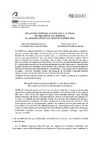Please use this identifier to cite or link to this item:
https://accedacris.ulpgc.es/jspui/handle/10553/70438
| Title: | Desajustes entre el significado y la forma en preguntas encubiertas. El análisis sintáctico desde el significado | Authors: | Gutiérrez Rodríguez, Edita Pérez Ocón, Pilar |
UNESCO Clasification: | 550510 Filología 570107 Lengua y literatura |
Keywords: | Pregunta encubierta Artículo con valor enfático Enseñanza de la gramática Significado proposicional Desajuste, et al |
Issue Date: | 2019 | Journal: | Philologica canariensia | Abstract: | Las preguntas encubiertas son sintagmas nominales definidos que tienen un significado oracional, en lugar del empleo referencial típico de los sintagmas encabezados por el artículo definido. En este trabajo ofrecemos, en primer lugar, un repaso de las cuestiones más relevantes sobre las preguntas encubiertas: tipos, significado, comportamiento sintáctico y análisis. Nuestro objetivo principal, sin embargo, es investigar cómo se puede enseñar gramática de una manera distinta, que llegue a la forma desde el significado. Mostramos aquí por qué los sintagmas nominales de interpretación proposicional son un buen instrumento para ello. Explicamos en concreto cómo se pueden emplear estos sintagmas para reflexionar sobre conceptos como la composicionalidad, la selección, la diferencia entre gramaticalidad y aceptabilidad, o para comprender el significado de sintagmas y oraciones. Hacemos también una propuesta de actividades empleando métodos innovadores que favorezcan la reflexión y el estudio científico del lenguaje. Concealed questions are definite noun phrases that have a propositional meaning, instead of the typical referential use of the phrases headed by the definite article. In this paper we offer first a review of the most important aspects about concealed questions: types, meaning, syntactic behavior, and analysis. Our main objective, however, is to investigate how grammar can be taught in a different way (from meaning to form). We show here why concealed questions are a good instrument for this purpose. We explain, in particular, how these phrases can be used to think about concepts such as compositionality, selection, the difference between grammaticality and acceptability, or to understand the different meaning of a nominal phrase and a sentence. We also propose activities using innovative methods that favor reflection and the scientific study of language. KEYWORDS: concealed questions, emphatic determiner, grammar teaching, propositional meaning, mismatch |
URI: | https://accedacris.ulpgc.es/handle/10553/70438 | ISSN: | 2386-8635 | DOI: | 10.20420/PhilCan.2019.258 | Source: | Philologica canariensia [ISSN 2386-8635], n. 25, p. 66-85 |
| Appears in Collections: | Artículos |
Page view(s)
116
checked on Jan 10, 2026
Download(s)
92
checked on Jan 10, 2026
Google ScholarTM
Check
Altmetric
Share
Export metadata
Items in accedaCRIS are protected by copyright, with all rights reserved, unless otherwise indicated.
